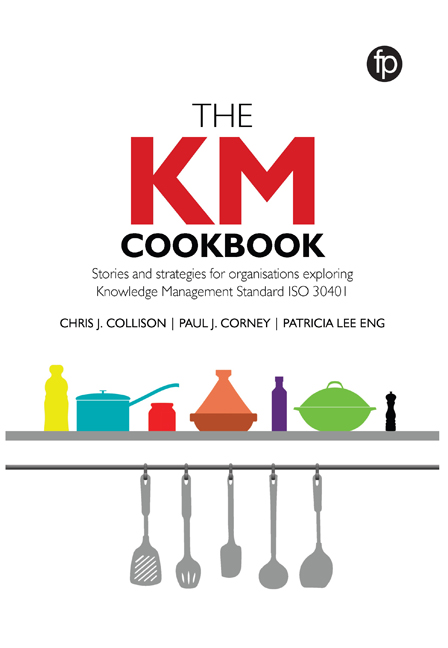 The KM Cookbook
The KM Cookbook About the Book
Published online by Cambridge University Press: 02 October 2019
Summary
After many years of committee meetings and discussions, the Inter - national Standards Organization (ISO) published a standard for Knowledge Management systems (that's systems with a small ‘s’) in November 2018. Adoption of the standard is voluntary. However, if used wisely, it provides a very helpful list of ‘ingredients’ for organis - ations to consider and gives professional credibility to a discipline which has been accused by some of being poorly defined or even ‘fluffy’!
As experienced practitioners and authors, Paul Corney, Chris Collison and Patricia Eng feel strongly that this international recog nition of Knowledge Management at an organisational level provides an important moment for KM to receive strategic attention. At this writing, there is also work under way to provide ‘Chartered Knowledge Manager’ status for individuals working in the field – hence it is a key time for professionalising Knowledge Management.
We believe that this is the moment to share and celebrate the work of successful organisations, and to include these stories into a practical and inspirational guidebook for leaders.
Conversely, it would be disappointing if the new standard resulted in a compliance or box-ticking exercise when it's actually a golden opportunity to ‘prepare the perfect dish’ of strategy, process, methods and leadership.
We want the book to stand out and be accessible, so we will be employing the cooking metaphor and finding parallels for the cook book: ingredients, recipes, menu, decorations, kitchen staff, chefs, hygiene inspectors – relating these to strategy, measurement, methods and tools, policy, communication, engagement, implementation, roles, leadership, external advice and governance.
Patricia's experience as a certified quality management programme inspector and creator of an award-winning KM programme brings a unique perspective. Her input will provide key insights into the ISO KM standard and the auditing process to help organisations prepare for an ISO KM audit.
The remainder of the book will be dedicated to a selection of ‘menus’ from organisations that have a particular strength in the way they have implemented their KM approach.
- Type
- Chapter
- Information
- The KM CookbookStories and strategies for organisations exploring Knowledge Management Standard ISO 30401, pp. xiiiPublisher: FacetPrint publication year: 2019
